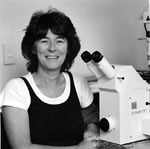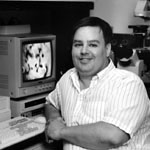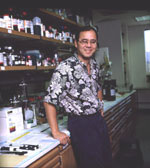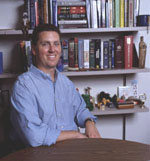|
Biochemistry Research Opportunities
 |
|
|
What you
would do: This project will
be available starting in January to analyze a plant mutant that has
increased sensitivity to the phytohormone auxin. The project
involves phenotypic characterization and recombination mapping using PCR-based
molecular markers. This would be appropriate for a BIOS 310 student.
Suggested experience:
I am looking for someone who is interested in genetics, and who is
interested in the possibility of continuing the project through the summer
(and possibly next year as well). A sophomore would be my first
choice; juniors and freshmen are also possibilities.
|
|
 |
|
|
|
What
would you do: This lab will studying
Gravitoxic Drosophila (fruit fly) mutants.
Positions Open: I
need 4-5 undergrads next semester. If you are interested email her
ASAP at kate@bioc.rice.edu.
|
|
|

|
|
|
|
What
would you do: Molecular genetic techniques are used
to elucidate the functions of genes involved in plant cell signaling and wall genesis. We are interested in how these genes are used to help plants
adapt to environmental stress.
Organization:
Most
undergraduate students have relatively independent research projects or
may work closely with a graduate student or postdoc. Some students
who have little or no experience may start by helping to prepare reagents,
pour plates, do DNA preparations, etc.
Positions Open: I
usually have at least two positions for undergraduate researchers in my
lab.
|
|
|

|
|
|
What
you would do: This will be for a paid lab assistant to do dishes, autoclaving and help with
experiments.
Positions Open: I
will probably have one position available next semester. A work-study
student would be preferred.
Environment: This
lab will require about 10-15 hours/week.
|
|
|

|
|
|
What
you would do: In this lab, you would
study neurotransmitter biding to neural receptors.
Positions Open: I
may have a position this spring.
Environment: This
lab will require about 12 hours/week.
|
|
|

|
|
|
Positions Open:
I always have (unpaid) research
projects for undergrads.
Note: Typically
students contact me, we talk about what they are interested in doing and
how much time they have for the project, and we find something.
|
|
|

|
|
|
What you
would do: This lab is composed of people from many
different backgrounds, and does a
very broad range of research (ranging from evolution studies to
yeast genetics to bioengineering), and it is consequently difficult to say anything
specific about what sort of projects new people might pursue in this lab. Most
undergraduate students work on cloning new biosynthetic genes or generating mutants in
known genes to make enzymes with new functions.
Organization: Students initially
work closely with a graduate student, and then become independent
as they become more experienced.
Suggested experience: I
would rather take students as freshmen or sophomores, and have them
work with me for several years than take more advanced students and
have them work for a semester or two. I do not expect incoming students to have any
specific courses or lab experience, but they must be motivated and organized so as to come
up to speed quickly.
Note: This lab is an appropriate
place for people interested in graduate school in the biological end of chemistry or the
chemical end of biology. We are not doing anything directly medical, and premedical students would probably be better served by finding research
opportunities in the medical area. |
|
|
 |
|
|
What
you would do:
As for projects, they
change all the time and I try to match a project to a student's interests.
Positions Open: I
will usually take up to 2 undergraduates at a time, but no more.
Organization: I
routinely have undergraduates doing research in my laboratory. There
is even a summer program in computational biology. It seems best
when students spend two semesters on a project as it takes a while to get
started. You may also know that the biochemistry and Cell Biology
department encourages senior research for students with a B average or
better. I have had many of these students.
|
|
|
|

|
|
|
What you
would do: Research efforts in this laboratory are divided
into two project areas: Probing molecular interactions during
DNA strand exchange mediated by the RecA protein of Escherichia coli and design of
modular proteins that mimic the properties of natural enzymes.
What you would learn: Strong
emphasis is placed on understanding what you are doing and why it is important.
Environment: Laid back,
and easy. Not too hard-core. The professor is motivating, although he is often
difficult to find. The other people do not push you to challenge yourself. You
typically work 10-20 hours/week.
Suggested Experience:Both
semesters of orgo (Chem 211 and 212). If interested in biochemistry, Bios 301and 302 are
recommended. |
|
|
|